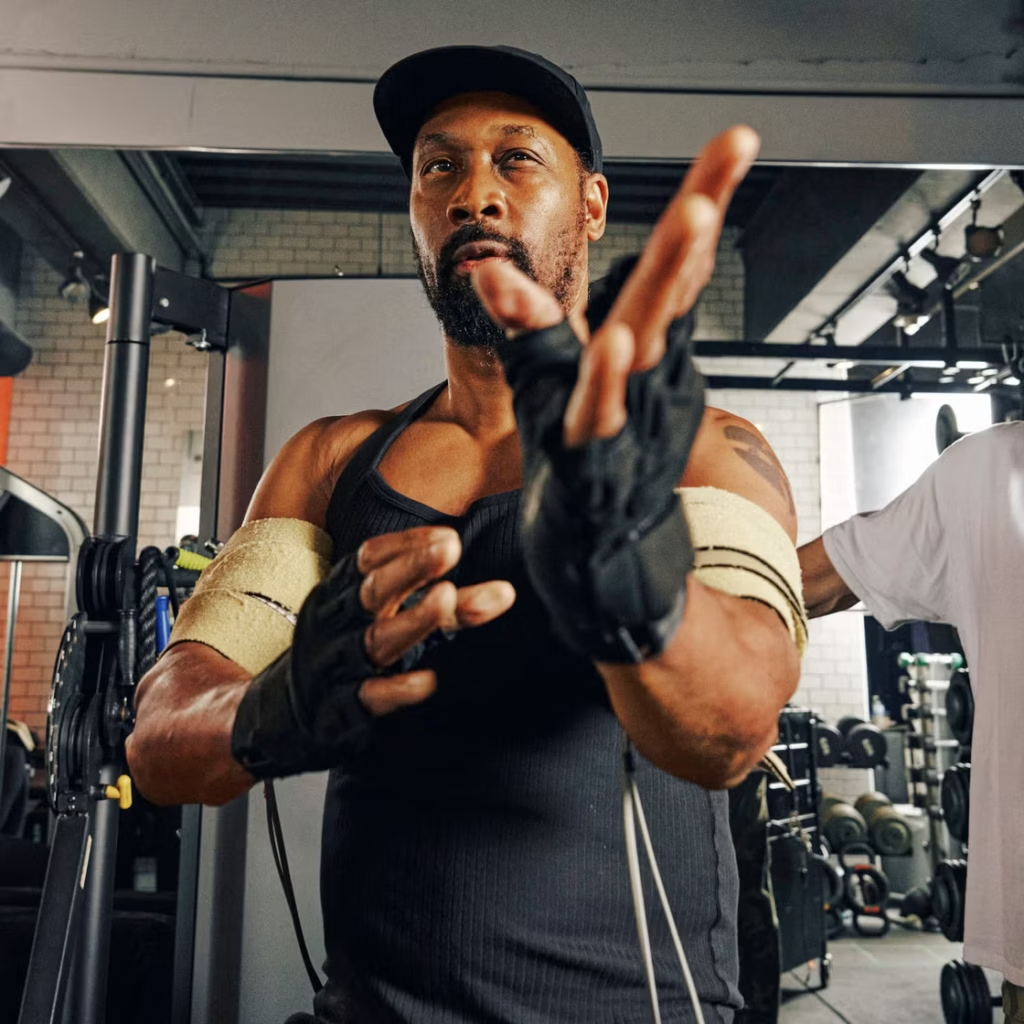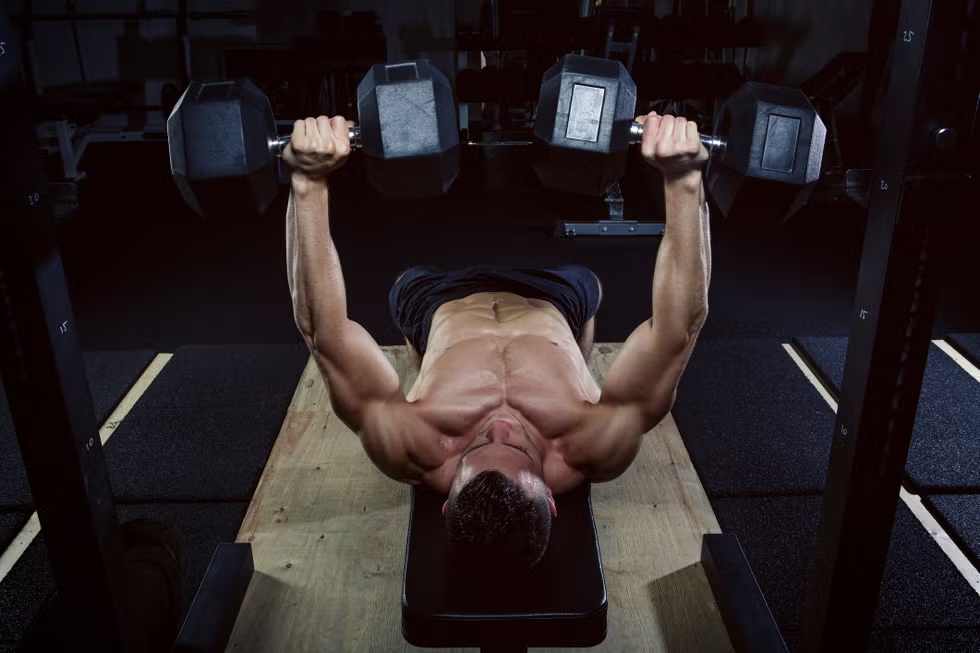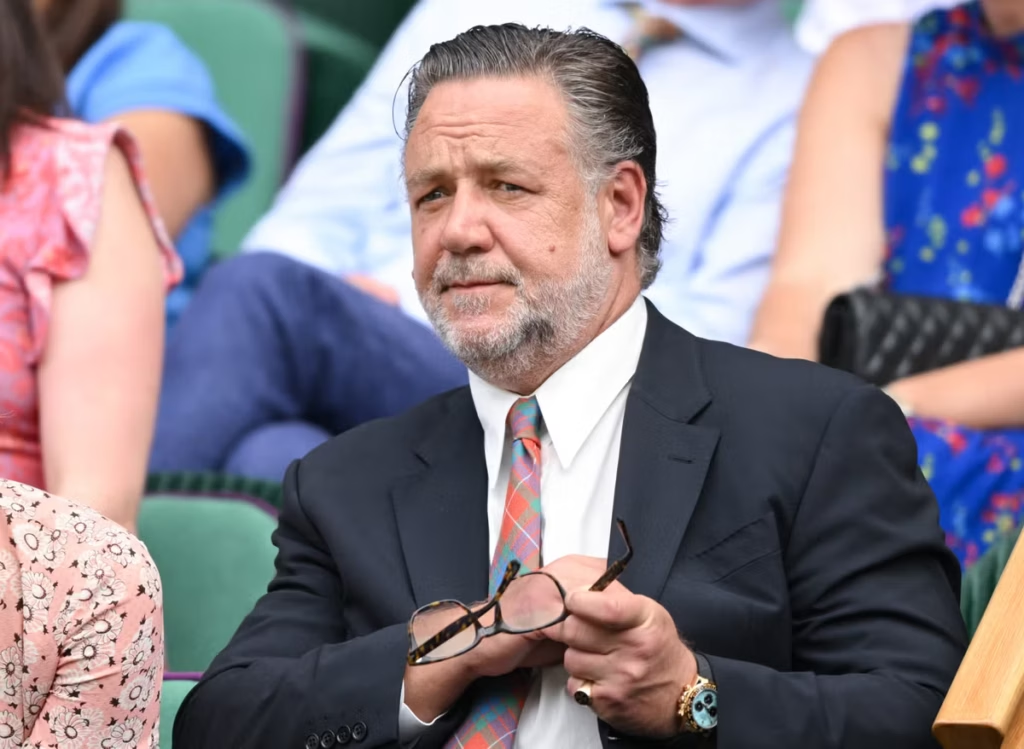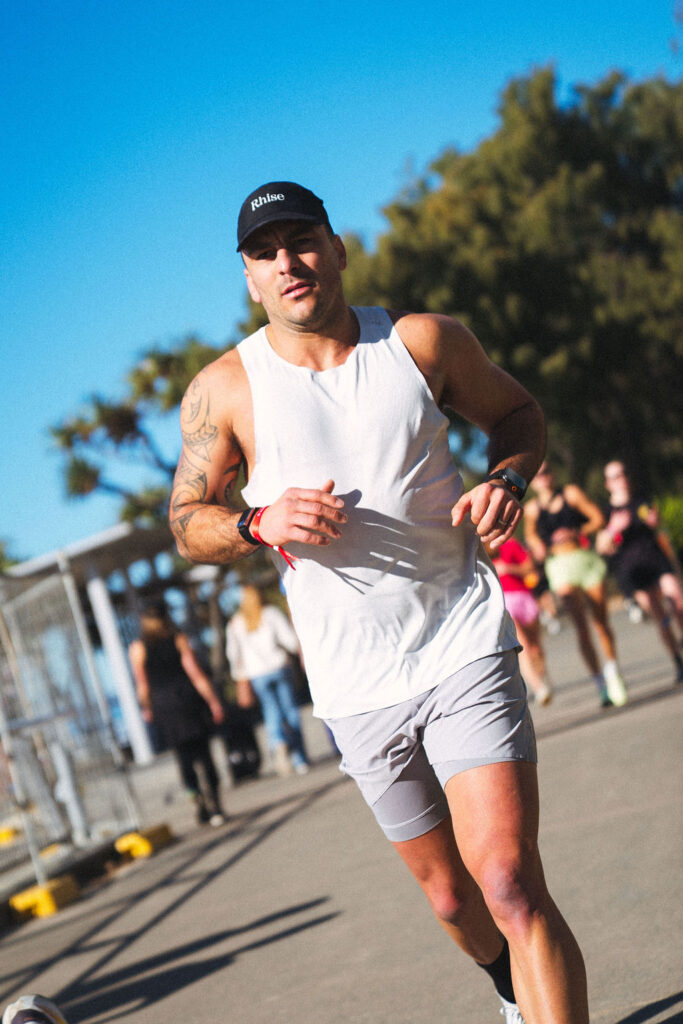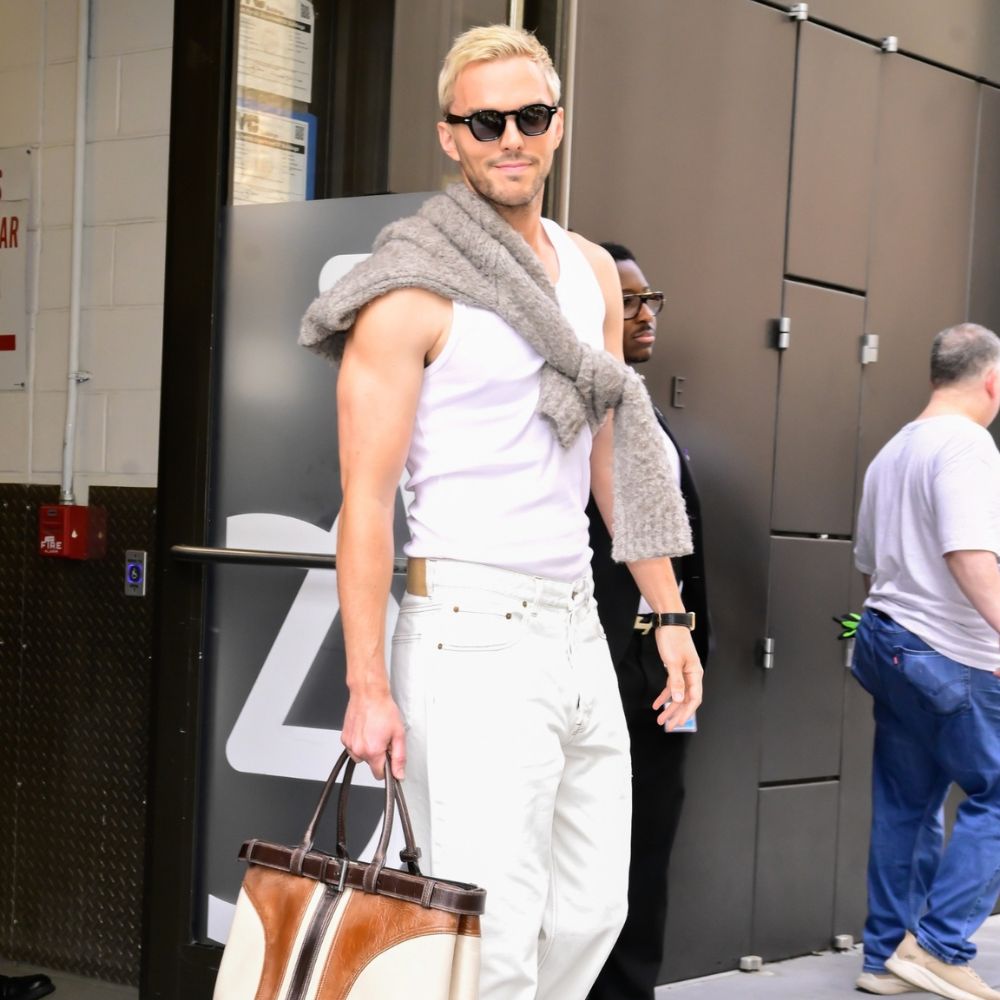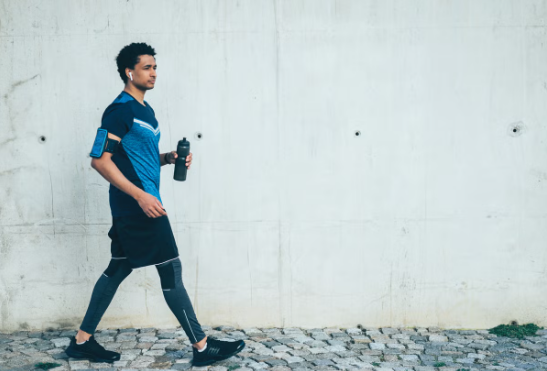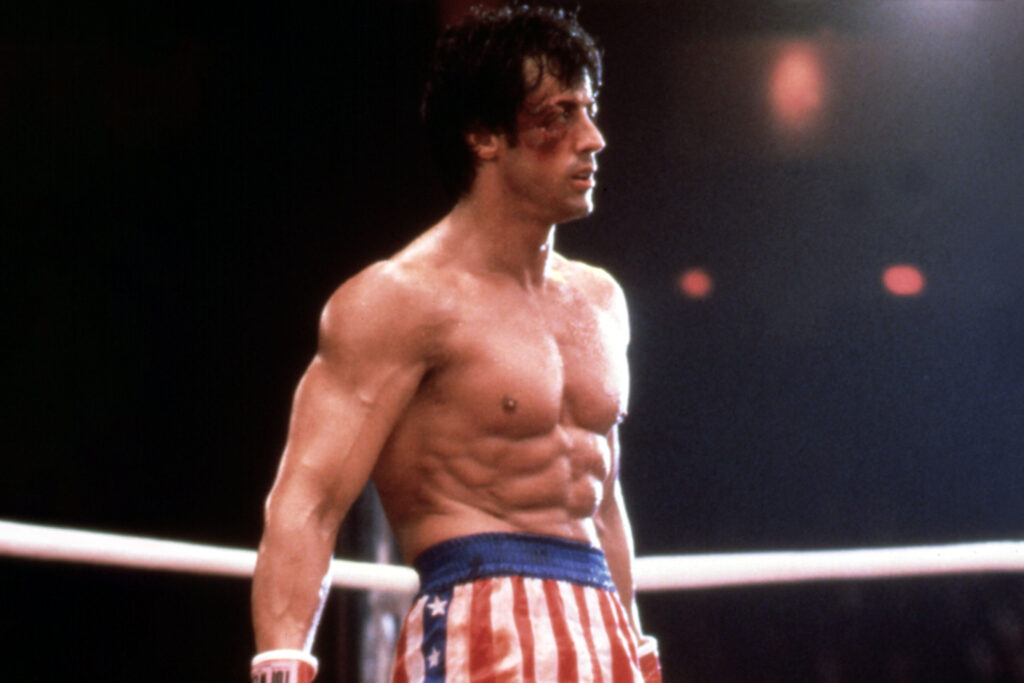LINCOLN YOUNES IS taking a moment to gather himself for a task that requires him to dig deep. On set today with Men’s Health, the 32-year-old actor is standing on the balcony of a well-preserved, delightfully kitschy apartment overlooking Sydney Harbour, that probably had its glorious heyday back in 1977.
The brief calls for Younes to summon a tricky mix of campness, irony and self-awareness to occupy the headspace of a self-absorbed, blithely unaware and breathtakingly irony-free retro douchebag, who the crew on set today have taken to calling ‘Chad’.
Younes breathes deeply, flexes his cut-from-clay torso and looks up at the camera, his blue eyes twinkling, eyebrow arched just so, as he peers over a pair of polaroid-style sunnies you might have found on a Santa Monica beach rollerblader sometime during the Reagan administration.
As you might anticipate, the camera loves Younes. Loves those liquid blue eyes and crinkly smile – probably doesn’t mind drinking in his rippling physique, either. And Younes, in turn, loves it back. Loves the possibilities a lens offers him to connect with an audience, to explore the contours of a character – even one like Chad – and perhaps most of all, to roll around with the flaws and foibles, the chinks and cracks in the human psyche, pushing himself into areas that challenge expectations. In front of the camera is where he feels fearless, he says, a place he’d previously only inhabited as a teenager on the soccer field. It’s a feeling that creates a sense of possibility.
“I think because of sport, I created very early this mentality that I wanted to push myself, for myself,” he says. “People have expectations and needs of you, but a lot of the time I will want to exceed those expectations for myself, so I feel like I’m growing. And if something becomes too easy or simple or doesn’t give me fear, then I’m usually not doing enough. I’ve gotten very used to being uncomfortable and that being a good marker that you’re headed in the right direction.”
That’s something Younes has learned over a career that’s run the gamut from effortless and seemingly blessed at times, to ill-fated and unlucky at others; yes, much like life. But through it all, what he’s invariably found is that when you do get comfortable with being uncomfortable, there isn’t much that’s beyond your grasp.

I’D FIRST MET Younes a couple of days earlier at Paddo Performance gym in Banksmeadow, where he took us through his workout routine under the watchful eye of trainers, Paul Xydis and Emma Howlett. Afterwards, we find time to chat in the gym’s massage room, a model of a skeletal foot adjacent to Younes’ head, as if poised to kick him if he veers off script – the trouble being that looking back on a life is often an exercise in recalling serendipitous moments, cringing at forehead slapping mistakes and, if you’re lucky, basking in occasional sparks of inspiration; there is no script.
The son of a Lebanese father and Australian mother, Younes begins telling me about his peripatetic childhood, which saw him and brother Jordy move around due to their mother’s work as a journalist. Eventually the three settled in Bendigo, in country Victoria, where his mum became editor of the local paper, the Bendigo Advertiser.
Younes describes himself as an energetic kid, who needed to expend that energy, lest it find expression within his head. “If it wasn’t exerted physically through sport or running, it would go to my mind, so exercise was always a bit of a soothing force for me,” he says. “It would calm me.” He was, he admits, a “massive nerd”, who spent much of his teenage years in solitude. “I would escape in books and video games; sport was probably the most social I would be,” he says.
The mix of athletic pursuits and bookishness sounds well-rounded, I venture. “You don’t remember it being well-rounded, but it’s like when you’re in school and all the things that make you unique, you’re usually bullied for and picked apart,” he says. “But as you get older, they’re the things that people tend to gravitate towards you for, that individuality. But it’s very hard to see it as a good thing when you’re a kid.”
I ask him about the bullying; it seems to have shaped him. He nods. “Kids are cruel. But it [bullying] builds resilience and there’s a lot I would never change because I kind of like the person I am now.”
One of the hardest things about navigating tough times as a teenager, particularly in a country town, Younes says, is that you feel like your world is very small. “It’s a bit of an echo chamber of what you’re feeling and what you are perceiving,” he says. “But as soon as you step out of it, you realise things aren’t as serious, there’s a million other opinions, it doesn’t really matter.”
Given the way Younes’ life has turned out, it’s tempting to pore over his childhood experiences looking for the seeds of transformation, or for clues that explain his success. There are some familiar tropes in there, and some that bear Younes’ own unique footprint; the ugly duckling who becomes a model or leading man; the weedy nerd who takes to the gym; the bookish gamer who becomes so secure he can send himself up as a preening narcissist in a Men’s Health shoot; or the bullied kid who becomes a passionate mental health advocate (more on that later). Before all that could happen, though, Younes first had to shed another familiar skin: the sports-mad kid who dreams of representing his country.

Younes had begun playing soccer at just three years old and saw himself turning out for the Socceroos or entertaining packed houses in the Premier League – he’d made the Victorian state team, after all. “That’s what I wanted to do up until I was about 16, which more and more I feel like is quite a common cliché,” he says. “But the reason I thought it might be my path was because it was where I felt fearless and that remained until I found acting.”
The metamorphosis would begin in Japan, of all places, after an opportunity arose to try out for Peter Pan as part of the global Rock Eisteddfod, though the seed may have been planted earlier, when his mum gave Younes her press pass to attend movies, the proviso being he write reviews for the paper.
As it was, he managed to bluff his way into the Japan gig, despite never having performed before. It was all a bit of a lark until Younes saw the reactions of the audience. “I saw the joy and impact and different emotions. It felt meaningful to me,” he says. “I was like, This is a worthwhile pursuit. I knew whatever I was going to do had to impact people in some way. I was just a pirate in the background. But that was the beginning of all this craziness.”

I FIRST SAW Younes in Tangled, the type of deliciously knotty, thoroughly middle-class drama Foxtel were making their own there for a while back in the noughties/early 2010s. His character, Romeo, the son of iconic Aussie actor Ben Mendelsohn’s Vince, was I tell him, ‘a piece of work’.
Younes agrees. “I was a piece of work. It was a really good show and it was my first job, so I learned so much from it.”
Mendelsohn, who’s made a career out of humanising morally dubious figures, might have been the ideal mentor for the career Younes was to carve out for himself. From characters like Casey Braxton in Home and Away to John Ibrahim in The Last King of the Cross, Younes could never be accused of playing himself.
“We all have colours and it’s more fun to hone in on a part of yourself that you don’t usually lead with, without consequence,” he says of playing complex or conflicted characters. “In all good art, you need to risk something, I think. If you’re lucky enough to get a role where you can vicariously explore a part of yourself in a safe environment, for a good reason, it’s a bit of fun, to be honest.”
At the same time, you can’t fully inhabit these characters if you’re viewing them through a narrow moral lens, he says. “You can’t play a character that you’re judging. If you take the time to understand people, a lot of the time they’re misconstrued or there’s a lot of context we don’t know. So hopefully, in a more holistic way, you kind of get better at understanding the complexities of humans, which I think is a really wonderful benefit of acting.”
Indeed, one of the things Younes likes about his vocation is that it’s open-ended, boundless and, in its search for truths about the human condition, offers lessons and insights you can use in your own life. “As a craft, you’re never going to get it right and there’s no perfect score, there’s no metric,” he says. “So, that creates a lot of insecurity and uncertainty, but also a lot of freedom. You can kind of pave your way, which I think for artists, that’s necessary, and for creativity, it needs to not be black or white. It needs to be in the grey.”
Acting as a craft, is one thing. As a profession, it’s a capricious, anxiety-inducing feast or famine existence, in which judgment is intrinsic and rejection the norm. Needless to say, it can exact a significant mental toll.
“It’s pretty debilitating,” agrees Younes. “I’m definitely someone who likes to have a certain level of control, which I think is reasonable. But what it means is that when you’re working, you’re usually not growing as a human. You learn things, you meet new people. You might create a good show or a character or have a few minutes of elevated bliss, but it’s the in-between that is the work.”
That void between roles, where you bounce around your apartment waiting for the phone to ring, is where you’re tested, says Younes. “You grow as a person because that is the hardest,” he says. “When you wake up and you have nothing scheduled for your week and you don’t know when money’s going to come in and you don’t have any clarity on why you didn’t get this job . . . There’s so many whys, how’s and what-ifs, so I think if there’s a trick with acting, and maybe life, it’s just relinquishing control of a lot of things and being okay with that.”
Younes tell a story about his last day on Home and Away that underscores the sharp relief that exists between the glare of the spotlight and the darkness that exists without it. “One of the crew got on the PA and goes, “Knock, knock.” “Who’s there?” “Lincoln.” “Lincoln who?” “That’s showbiz.” And one, I thought it was so funny, but two, it’s true because it’s like you’re up there, you’re doing really well, you’re killing it, and then it’s forgotten.”
Indeed, do many of us remember – if we knew in the first place – that Younes landed a role in American ABC drama Grand Hotel in 2019 that was cancelled after one season? Or that he was cast in The CW’s Lost Boys pilot, a show that given its heritage, surely had the potential to be picked up, but was cancelled due to Covid. The fickleness of the profession must be tough, I point out. Younes doesn’t disagree but adds that the potholes and trapdoors inherent in plotting a path as an actor, are perhaps a necessary evil. “That’s the way it needs to be because no one should have too long in the spotlight,” he says. The reasons are clear enough. It’s not a safe place, you’re in danger of losing perspective, and well, you probably start taking yourself a little too seriously. After all, look at Chad.

BACK AT THE shoot, we’re moving through this time warp of an apartment, delighting in putting Chad in increasingly silly and absurd positions. As we break for a late lunch and Younes and the crew chat about life and movies in the apartment’s garish yellow-hued lounge room, there’s a sense that the day is drawing to a close. Soon the moment will be gone, Chad will disappear, though his memory will live on in our shoot. It’s a microcosm, if you like, of what Younes experiences on every TV or movie set.
“It’s the weirdest, intense experience,” he says of shooting. “If you had to consolidate your entire schooling into a few months and all of those experiences, that’s what it feels like each time. You make friends, you make versions of family, there’s dramas that happen, there’s celebrations, and then it ends and you’re like, what am I doing with my life? That’s almost every single time. And I know I make it sound intoxicating, but you have to be a little delusional to do that.”
The concentration of experiences and emotions and the fleeting, often lightning-in-a-bottle nature of a capturing a moment in time, echoes the elusiveness and possibly pointless search for happiness and contentment Younes believes we all fall for growing up. “I just think because of the games we played, the movies we watched, the stories we were told growing up, it’s always leading to this apex,” he says. “It’s always like, you do all this [work] and then you finally get to this point where you just can relax and you’ve done it and all is well. And I think the realisation that that is not real has been really terrifying, and cathartic, and important, because while it might be true for a moment, it always cycles back.”
This might sound depressing, possibly nihilistic, yet Younes has found the opposite to be true, too. Hard times, struggle, despair, are usually equally transient feelings. That’s a potentially comforting thought when you’re going through them, he says. “The thing that’s gotten me out of really hard spots in my life is that I might be feeling the lowest I’ve ever felt – depression, whatever it is. But someone told me a long time ago that whatever you’re feeling right now, you’ll feel the inverse of it. So anytime that life’s been really difficult or life’s been really amazing, I’ve just tried to be present and take note of it and know that it’s ephemeral and I can’t hold onto it. All I can do is acknowledge it, experience it, and know that it is going to pass and enjoy it in the moment or be consoled that it won’t last forever.”
I can’t say I was expecting this degree of reflection or insight from Younes. His willingness, not only to put himself out there but open himself up, speaks to an empathetic, curious and likely restless spirit. What isn’t surprising, after talking to Younes for a while, is that he’s looking for nuanced ways to explore interior life onscreen – aiming for what he describes as two degrees left of centre, a neat side-step from a trope.

He’s currently working, for example, on a dark comedy that digs into different personifications of anxiety. “It sounds really crass to say in this way, but it’s so fascinating,” he says of the worlds and the demons that sometimes occupy the hinterlands of our minds. “Some of the best movies, some of the best characters are the ones that tap into a very intense, simple version or facet of mental health. It doesn’t have to be extreme things like addiction, but it just might be one perception of life in an otherwise pretty normal existence, that is different. And if you have that, that’s your key.”
Younes’ interest in mental health has spilled over into advocacy. In 2021, he created The10Challenge, in which participants were invited to walk 10,000 steps, walk 10km, or run 10km, every day for a month. Younes took the hard route, of course, the challenge reinforcing to him the importance of consistent habits. “I need to do some kind of challenge, once or twice a year,” he says, “because otherwise my energy goes to my mind and that’s not the best place.”
For that reason, daily exercise is a must, he says, though his routine “goes out the window” on set. He also makes time to express gratitude. Each morning, when he wakes and each night before he goes to sleep, Younes identifies three things he’s grateful for, three things he’s proud of and three people he can reach out to that day. “Your mind will go, This is stupid, this is clichéd, this boring, blah, blah, blah. But it takes five minutes. I don’t know if it helps or not, but I just feel it’s better to do something and make it a bit of a rule than not have anything. The consistency creates the safety, the safety creates the healing.”
And the healing creates the story . . . before the next challenge arises. If it hasn’t become clear by now, Younes is a deep-thinking, contemplative soul who’s working hard at being the best version of himself. Like many of us, (though probably not Chad) he didn’t peak in high school, though as he’s made clear, there are no real peaks in life. Just a rolling series of summits and valleys that you do your best to navigate and keep forging forward. Same goes for you, me, all of us – the only ones spared from this ceaseless journey, our alter egos, for whom every day is golden.
Lincoln Younes’ full-body workout
Growing up, Younes had a “typical teenage soccer body” comprised of strong legs, with little going on up top. “I was genuinely a twig for all my teenage life and it made sports very hard, but I was fast so I could get away from people,” he says.
It wasn’t until he was on Home and Away that Younes really got into the gym, under the guidance of trainer Yani Burmeister. “He was my introduction to fitness and health, and I credit a lot of stuff to him,” Younes says. “He taught me about consistency and patience.”
These days, Younes trains at Paddo Performance, where trainers Paul Xydis and Emma Howlett help get him in shape for roles and ensure he stays consistent between them. “They have just been a constant source of support, and energy, and persistence, and patience when I’ve needed it,” says Younes. “They’ve changed my life.”
Here’s Younes’ full-body workout:
Warm up
- Plank – 2 x 30 seconds
- Hip swings
Workout
- A Deadlifts 2 x 5
- B DB Shoulder Press 2 x 8-10
- C Leg extension 2 x 12-15
- D Lat-pulldown 2 x 10-12
- E DB Biceps curls 2 x 8-10
- F Dips 2 x 10-12
- G Hanging knee raise 3 x 10-12
*Note: these are max effort sets. Younes does warm-up sets beforehand.
Words: Ben Jhoty
Editorial director: Christopher Riley
Photography: Bananas Clarke
Creative Director: Grant Pearce
Head of Social and video: Arielle Katos
Grooming: Michael Brennan
Producer: Sofia Sallons
Art direction: Evan Lawrence
Fashion assistant: Laura Annis-Brown
Video: Jasper Karolewski









